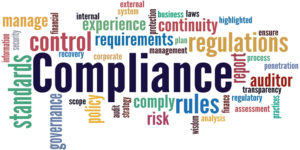Legislative work on the draft Law on Protection of Whistleblowers dated October 14, 2021. (the so-called whistleblower law, hereinafter: "Law") we have been following for a long time. After a protracted period of stagnation in the opinion phase, the draft went before the Committee for European Affairs. There had already been doubts about whether factoring services, particularly entities with fewer than 50 employees, would be covered by the Act, and thus by what date a whistleblowing system (beyond AML itself) should be implemented. And this is all due to the complicated grid of references in the current Article 23(2) of the draft Law.
#Where does the problem lie?
Article 23(1) of the Law indicates that businesses with fewer than 50 employees are exempt from implementing whistleblowing procedures. However, according to paragraph (2), the 50-employee threshold does not apply to a legal entity that performs activities in the fields of financial services, products and markets, and anti-money laundering and terrorist financing, transportation security and environmental protection, covered by the European Union acts listed in Part I.B and II of the Annex to Directive 2019/1937".
In other words, despite a general exemption from whistleblower laws for institutions with fewer than 50 employees, The law excludes this exemption for those institutions that are covered by the annexes to Directive 2019/1937 (hereinafter: "Directive") Even when they have fewer than 50 employees.
Going further, the Directive's material scope includes, among other things, financial services, products and markets, and the prevention of money laundering and terrorist financing, which are detailed in Part I.B of the Directive's Annex. Part I.B refers in this regard - once again - to:
- actions listed in Annex I to Directive 2013/36/EU of the European Parliament and of the Council of June 26, 2013. On the conditions for allowing credit institutions to operate etc..;
- straight into Regulation of the European Parliament and of the Council (EU) No. 575/2013 dated June 26, 2013. On prudential requirements for credit institutions and investment firms.
The two pieces of legislation are interrelated, as the content of one refers to the content of the other. Regulation No. 575/2013 contains a definition of "financial institution" (in Article 4(1)(26)), which reads as follows (in brief): "A company other than an institution whose primary activity is the acquisition of stakes or Performing at least one of the activities listed in points 2-12 and point 15 of Annex I to Directive 2013/36/EU (...)".
Point 2 of Annex I to Directive 2013/26/EU explicitly mentions as a type of activity subject to mutual recognition factoring with or without recourse.
#U UKNF comments.
The law went through a lengthy opinion stage, but only at its final stage did the UKNF point out that "It needs to be clarified which entity performing AML activities (...) This is because it is not clear whether it is an obligated institution that performs duties under the AML Law." The project proponent (Minister of Family and Social Policy) stated in response that: "In this regard, it is necessary to analyze the legal acts of the European Union listed in Part I.B and II of the Annex to Directive 2019/1937 (outside the jurisdiction of the MRiPS)."
1TP5Is there a chance for change?
Given that the regulations are in the process of being enacted, the provisions are unclear (it is very likely that the authorities themselves will have trouble defining the scope of the law's subject matter, let alone entrepreneurs), official interpretation may emerge / or the final content may change by the time of final enactment, the draft is still subject to change, especially after the recent UKNF comment.
Nonetheless, it seems unlikely that the legislature will back off from extending whistleblower regulations to factoring (the legislature has taken all financing activities at gunpoint), hence the factoring industry should stay alert and watch the legislative process. For the moment, the legislature is giving 2 months from the day the law is promulgated to build and implement a whistleblowing system.
The changes, the draft and the comments made can be previewed on the RCL website






